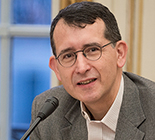CEPII
CEPII - это ведущий французский центр исследований и экспертизы мировой экономики. Он вносит свой вклад в процесс формирования политики благодаря независимым углубленным анализам международной торговли, миграции, макроэкономики и финансов. CEPII также создает базы данных и предоставляет платформу для дискуссий между учеными, экспертами, практиками, лицами, принимающими решения, и другими частными и государственными заинтересованными сторонами. Основанный в 1978 году, CEPII является частью сети, координируемой организацией France Strategy, входящей в состав службы премьер-министра. Source

Pablo Winant
- Money & Finance
- Trade & Globalization
Scientific Advisor at CEPII Associate Professor of Economics at ESCP Business School Professor at Ecole Polytechnique / Research Affiliate at CREST Research Interests: macro-finance international macro inequalities computational economics

Antoine Vatan
- La baisse de la part salariale : reflet de la montée en puissance des investisseurs institutionnels ?
- Institutions and Customs Duty Evasion
- L'évolution du partage de la valeur ajoutée en occident
- Comment expliquer la déformation du partage de la valeur ajoutée depuis 30 ans ?
- Le partage de la valeur ajoutée : un problème capital
- Partage de la valeur ajoutée. Une déformation au détriment du travail
- Répartition de la valeur ajoutée entre revenus du travail et du capital : de quoi parle-t-on ?
- Hierarchy of Trade and Sequential Exporting
- En quoi les décisions des multinationales nous concernent-elles ?
- En quoi les decisions des multinationales nous concernent- elles ?

Farid Toubal
- Trade & Globalization
- Migrations
- Competitiveness & Growth
Farid Toubal is scientific advisor at CEPII. He is Professor of Economics at University Paris-Dauphine -- PSL His research mainly focuses on multinational activities, international trade and migration. Multinational Activities International Trade Migration
- Trade Liberalization, Collective Bargaining and Workers: Wages and Working Conditions
- Taxation minimale des multinationales : "Il fallait fermer le robinet de l’évitement fiscal", analyse l'économiste Farid Toubal
- Taxation minimale des multinationales : "Il fallait fermer le robinet de l’évitement fiscal"
- L'impôt global sur les multinationales profitera-t-il à tous les pays?
- L'impôt global sur les multinationales profitera-t-il à tous les pays ?
- Fiscalité internationale des entreprises, est-ce possible ?
- Fiscalité internationale des entreprises, est-ce possible ?
- L'évitement fiscal des multinationales favorise les concentrations
- Évitement fiscal : un avantage concurrentiel qui aggrave la concentration
- The March of the Techies: Job Polarization Within and Between Firms

Ariell Reshef
- Trade & Globalization
Ariell Reshef est conseiller scientifique au CEPII. Il est Directeur de Recherche au Centre d'Économie de la Sorbonne (CES, UMR 8174) and Associate Member at the Paris School of Economics. Homepage: http://www.parisschoolofeconomics.com/reshef-ariell/home.htm
- L’industrie française est-elle tributaire de la Chine ?
- Fewer Planes Means Less Trade
- L’industrie française est-elle tributaire de la Chine ?
- À quel point l'industrie française dépend-elle de la Chine?
- The March of the Techies: Job Polarization Within and Between Firms
- Les chaînes de valeur mondiales à l’épreuve de la crise sanitaire
- Chaînes de valeur mondiales et dépendances de la production française
- La fragmentation des chaînes de production a changé le partage de la valeur ajoutée
- Are Your Labor Shares Set in Beijing? The View through the Lens of Global Value Chains
- La disparition des classes moyennes, et après ?

Hillel Rapoport
- Migrations
- Trade & Globalization
Scientific advisor Professor at the Paris School of Economics, University Paris 1 Patnéon-Sorbonne Directeur of the department "dynamics" of the Migration Institute Development Economics, International Economics, Economics of Migration
- Free Trade Agreements and the Movement of Business People
- Immigration : la France peut mieux faire pour attirer les travailleurs qualifiés, selon le Conseil d'analyse économique
- En dépit des pénuries de main-d’œuvre, l’immigration professionnelle reste compliquée
- How Do Immigrants Promote Exports?
- Migration and Cultural Change
- Weather Shocks and Migration Intentions in Western Africa: Insights from a Multilevel Analysis
- Does Birthplace Diversity affect Economic Complexity? Cross-country Evidence
- Migrant inventors and the technological advantage of nations
- Migration and inequality in the Western African Economic and Monetary Union
- Diaspora externalities

Lionel Ragot
- Migrations
- Environment & Natural Resources
Lionel Ragot is a Scientific Advisor for the program Emerging Economies / International Migrations. Migrations
- Le pétrole russe, c’est (presque) fini
- Croissance, immobilier, climat : les défis immenses du troisième mandat de Xi Jinping
- La domination chinoise sur le marché des métaux stratégiques
- Énergie: tempête en vue?
- Énergie: tempête en vue?
- Énergies: se passer de la Russie, à quel coût?
- Énergies: se passer de la Russie, à quel coût?
- Énergies: se passer de la Russie, à quel coût?
- Énergies fossiles russes: l'UE à l'épreuve de sa dépendance
- L’OPEP + promet de produire davantage de pétrole

Joaquim Oliveira Martins
- Trade & Globalization
- Environment & Natural Resources
- Competitiveness & Growth
- Economic Policy
- Emerging Countries
Joaquim Oliveira Martins is Counsellor at CEPII Special Advisor, EU Commissioner for Cohesion and Reforms Lecturer, University Paris Dauphine-PS Member of the Leadership Council of the Sustainable Development Solutions Network (SDSN), UN President of the Board, Centre for International Research and Economic Modelling (CIREM), CEPII https://authors.repec.org/pro/pol2/ http://ssrn.com/author=151928 https://www.researchgate.net/profile/Joaquim_Oliveira_Martins Special Advisor, EU Commissioner for Cohesion and Reforms 2021 – … - To provide advice and knowledge in the field of Cohesion policy, synergies between Cohesion and innovation and entrepreneurship, regional development and growth. Counsellor, Centre Etudes Prospectives et Informations Internationales (CEPII, Paris) 2020 – … Deputy-Director, OECD Centre for Entrepreneurship, SMEs, Regions and Cities 2018 –2020 - Co-leadership and management of the CFE Centre (140+ staff) in charge of Entrepreneurship, SME policies; Regional, Rural and Urban policies. Special Advisor, OECD Centre for Entrepreneurship, SMEs, Regions and Cities 2017 – 2018 - In charge of advising the Director of the CFE Centre on developing an integrated approach between Entrepreneurship, SMEs and Regional policies. Head of Division, OECD Regional Development Policy Division 2009 – 2017 - Managing a division producing Country Reviews of Regional, Urban and Rural Policies, and thematic studies on Regional Growth and Convergence, Innovation and Multi-level Governance. Head of Division, OECD Structural Economic Statistics Division 2007 - 2009 - Managing a division producing analysis and data on International Trade in Goods & Services, Measurement of Globalisation, Entrepreneurship and Business Statistics, Productivity Statistics, Labour and Population Statistics. Senior Economist, OECD Economics Department 1994 - 2007 - Head of Projects on The Policy Determinants of Investment in Tertiary Education, Health and Long-term OECD Public Expenditure Projections and Impact of Ageing on Growth (2004-07) - Head of Desk responsible for the Economic Surveys of Brazil, Chile, the Baltic States, Slovenia, the Slovak Republic and Romania (1996-2003) - Head of Projects on Competition, Regulation and Performance and Policy Response to the Threat of Global Warming (1994-95) Economist, OECD Economics Department 1991 - 1993 - Contributor to reports on the Costs of reducing Carbon Emissions (co-author of the OECD GREEN model, an economic-environmental world general equilibrium model), Distribution systems in OECD countries and, Trade, Market structure and Industry wages Research Fellow, Centre d'Études Prospectives et d'Informations Internationales (CEPII, Paris) 1982 - 1990 - Various projects on Balance of Payments analysis, Service trade, International Competition in manufacturing industries, International trade modelling, Economic Development in the Asia-Pacific region Associate Researcher, CEPII 1981 - 1982 - Construction of a World Harmonised database on Balance of Payments (CHELEM-BoP)
- Globalization, Freedoms and Economic convergence: an empirical exploration of a trivariate relationship using a large panel
- Reform design matters: The role of structural policy complementarities
- Regional policy narratives and the Geographies of Discontent
- New Trends in Regional Policy: Place-based Component and Structural Policies
- Regional inequalities and contributions to aggregate growth in the 2000s: an EU vs. US comparison based on functional regions
- Towards Cohesion Policy 4.0
- Impact of macro-structural reforms on the productivity growth of regions: distance to the frontier matters
- The role of policy and institutions on health spending
- Vers un nouveau paradigme des stratégies de développement régional dans l'OCDE
- The Contribution of Regions to Aggregate Growth in the OECD

Éric Monnet
Éric Monnet is scientific advisor to the CEPII. I am an economic historian and macroeconomist seeking to better understand how the evolution of finance, state intervention in credit markets, central banking and the international monetary system has shaped European economies since the 19th century. Understanding where we come from should be an essential contribution to current policy debates. My work aims at being interdisciplinary and showing how historical methods can inform and challenge economic thinking. I share this goal with my colleagues of the François Simiand Center for social and economic history at the Paris School of Economics & EHESS. I am editor of La Vie des Idées/Books & Ideas, a social sciences website in French and English - supported by the Collège de France - which publishes book reviews and original essays for the general public. Please be in touch if you wish to contribute. Links to my articles also lead to original datasets that I constructed and that are available on journals' websites or other repositories. Do not hesitate to contact me if you are looking for additional data, or information about them. I am in the process of making all data from my book Controlling Credit available as well. Before 2019, I worked for 6 years for the Eurosystem, as an economist at the Banque de France. I was part of the teams in charge of producing forecasts (on France) and economic analyses (especially on housing investment and prices, then on euro area architecture) . I am now a consultant at the Banque de France on issues related to the international monetary system (starting Dec. 2020). I am a member of the editorial boards of Explorations in Economic History and la Revue d'histoire moderne et contemporaine.

Valérie Mignon
- Money & Finance
Valérie Mignon is scientific advisor to the CEPII. She is also co-editor of the CEPII's academic journal International Economics. Holding a Ph.D. in Economics, Valérie Mignon is professor at the University of Paris Nanterre, where she teaches macroeconomics dynamics, international finance, and econometrics. After having been the director of the EconomiX research centre (UMR 7235 of the CNRS) for nine years (2011-2020), she is responsible for the International macroeconomics, banking and financial econometrics team of this same centre and director of the Master in International Economics and Macroeconomic Policy at the University of Paris Nanterre. President of the 5th section of the National Council of Universities (CNU), she is also scientific advisor to the CEPII, co-managing editor of the academic journal International Economics (Elsevier), member of the Cercle des économistes and president of the French Economic Association (AFSE). Her research focuses primarily on macroeconomics and international finance, exchange rate dynamics, oil and energy markets, and econometrics. She has published approximately 100 articles in peer-reviewed journals and several books. Econometrics Macroeconomics International Finance
- Métaux stratégiques : et si les pays producteurs se regroupaient en cartel du type OPEP ?
- Métaux stratégiques : et si les pays producteurs se regroupaient en cartel du type OPEP ?
- La domination chinoise sur le marché des métaux stratégiques
- Croissance, immobilier, climat : les défis immenses du troisième mandat de Xi Jinping
- Métaux stratégiques : comment la Chine a étendu son emprise
- Not all political relation shocks are alike: Assessing the impacts of US-China tensions on the oil market
- Carburant. Pourquoi la baisse du prix du pétrole ne profite pas aux automobilistes
- Not all political relation shocks are alike: Assessing the impacts of US-China tensions on the oil market
- Les pays de la zone euro sont-ils suffisamment homogènes pour partager la même monnaie ?
- La hausse des taux d’intérêt va-t-elle déboucher sur une nouvelle crise de la zone euro ?

Jacques Melitz
- Money & Finance
- Europe
Jacques Melitz is an Advisor withe the CEPII. Professor of Economics, he worked for many years at the Centre de Recherche en Economie et Statistique (CREST) and at the Institut d'Etudes Politiques in Paris. He has held visiting positions at Harvard and Princeton Universities, has consulted for the OECD, the European Commission, the Federal Reserve, the International Monetary Fund, and the Swedish Government Commission on Monetary Union. He was managing editor of the Annales de l'INSEE from 1977 to 1983, served a six-year term on the board of editors of the European Economic Review from 1991 to 1997, is currently on the editorial boards of the German Economic Review and the Open Economies Review, and has been a research fellow of the CEPR since 1986. He is the author of one book, the co-editor of three other books, and has published over 50 refereed articles and numerous chapters in edited works. International Money and finance International macroeconomics European Monetary System
- WEALTH AND SHIFTING DEMAND PRESSURES ON THE PRICE LEVEL IN ENGLAND AFTER THE BLACK DEATH
- The Impact of Common Law on the Volume of Legal Services: An International Study
- Wealth and Shifting Demand Pressures on the Price Level in England After the Black Death
- The Primary Cause of European Inflation in 1500-1700: Precious Metals or Population? The English Evidence
- Somatic Distance, Trust and Trade
- Somatic Distance, Trust and Trade
- A model of the beginnings of coinage in antiquity
- English as a lingua franca: Facts, benefits and costs
- Some Doubts about the Economic Analysis of the Flow of Silver to China in 1550-1820
- Foreign Language Learning and Trade

Thierry Mayer
- Trade & Globalization
Thierry Mayer is currently professor of economics at Sciences-Po (http://econ.sciences-po.fr/staff/thierry-mayer). He also is a scientific advisor in CEPII, and a research fellow in the International Trade / Regional Economics programme at CEPR. His research is primarily focused on economic geography, trade theory and empirics as well as on foreign direct investment determinants. His recent publications include research on the impact of globalization on armed conflicts, as well as papers looking at the diffusion of cultural patterns across space. He also published theoretical and empirical analysis of locations choices by multinational firms, studying in particular the extent and determinants of agglomeration patterns. His most frequently cited research includes empirical studies on the level and causes of market fragmentation in the European Union. His research was rewarded by a number of distinctions in France, including the bronze medal of the CNRS. International Trade Geographical Economy Direct Investment
- The CEPII Gravity Database
- Poor Substitutes? Counterfactual methods in IO and Trade compared
- Free Trade Agreements and the Movement of Business People
- La libre circulation en Europe : réelle pour les biens et les capitaux, partielle pour les personnes
- The United States of Europe: A gravity model evaluation of the four freedoms
- Product Mix and Firm Productivity Responses to Trade Competition
- Technology-induced Trade Shocks? Evidence from Broadband Expansion in France
- Global Giants and Local Stars: How Changes in Brand Ownership Affect Competition
- Les défis du secteur automobile : compétitivité, tensions commerciales et relocalisation
- La bonne nouvelle des sanctions commerciales américaines

Mario Larch
Co-Editor of International Economics Personal website
- The International Trade and Production Database for Estimation (ITPD-E)
- Editorial, International Economics
- Editorial

Jérôme Héricourt
- Money & Finance
- International Transport costs: New Findings from modeling additive costs
- Le quoi qu'il en coûte, ça peut rapporter !
- Real estate booms are behind Europe’s productivity divergence
- Plans de relance budgétaire : quelle efficacité ?
- Gains from trade: International transport costs still matter, especially additive ones
- L’immobilier, ce fauteur de troubles économiques majeurs auquel personne ne s’intéresse vraiment
- Le plan infrastructures de Biden pour combler l'incroyable retard américain
- Quantifying the Financial Accelerator Across Countries
- États-Unis: l'électrochoc Biden
- États-Unis: l'électrochoc Biden

Christophe Gouel
- Trade & Globalization
- Environment & Natural Resources
Christophe Gouel has a PhD in economics from the Ecole Polytechnique. He is scientific advisor at CEPII and works within the scientific program “Trade policy modeling”. His works concerns mainly trade policies, agricultural policies and the MIRAGE model development. Christophe Gouel is an economist at INRA. He worked at the World Bank (2011-2012) and at CEPII (2006-2008) on the coordination of trade policies and their impact on agricultural price dynamics. Trade policy modeling
- The Role of Storage in Commodity Markets: Indirect Inference Based on Grains Data
- Energie : « Suspendre le soutien aux biocarburants peut aider à compenser la flambée des prix agricoles »
- Love of Variety and Gains from Trade
- The Crucial Role of Domestic and International Market-Mediated Adaptation to Climate Change
- Nutrition Transition and the Structure of Global Food Demand
- La demande alimentaire mondiale en 2050
- Nutrition transition and the structure of global food demand
- Managing Food Price Volatility in a Large Open Country: The Case of Wheat in India
- Trade Policy Coordination and Food Price Volatility
- Estimating the Competitive Storage Model with Trending Commodity Prices

Michel Fouquin
- Trade & Globalization
- Emerging Countries
- Competitiveness & Growth
Michel Fouquin is Advisor to the CEPII Professor at the FASSE Catholic University of Paris Member of the scientific board of JECO (journées de l’économie à Lyon) since 2009 Globalisation International Trade Trade Policy Emerging Countries Eastern Asia
- Sobriété et politiques industrielles et commerciales stratégiques
- L'Organisation mondiale du commerce : sortie de crise ?
- Geopolitics is the biggest threat to globalisation
- L’OMC en temps de crise internationale majeure
- The big mistakes of the anti-globalisers
- War, What Is It Good For?
- Net ralentissement de la croissance chinoise : bonne ou mauvaise nouvelle pour le reste de la planète ?
- Record du monde de la croissance en 2020 : les secrets de Taïwan sont-ils vraiment hors de notre portée ?
- Pénurie de puces électroniques : "On prévoit une pénurie qui va durer six mois" affirme un économiste
- Comment expliquer la pénurie de puces électroniques ?

Lionel Fontagné
- Trade & Globalization
- Competitiveness & Growth
Lionel Fontagné is currently Scientific Advisor with CEPII, of which he was Director for six years (2000-2006). He is Professor of economics at the University of Paris I Panthéon-Sorbonne since 1994 and associate chair at the Paris School of Economics. Personal page: http://lionel-fontagne.eu Foreign Direct Investment International Trade European Integration Computable General Equilibrium Model
- MaGE 3.1: Long-term macroeconomic projections of the World economy
- Regional Diffusion of Foreign Demand Shocks Through Trade and Ownership Networks
- Large firms react more strongly to macro shocks, and it matters
- Tariff-Based Product Level Trade Elasticities
- EU in Search of a WTO-Compatible Carbon Border Adjustment Mechanism
- L’UE en quête d’un mécanisme d’ajustement carbone compatible avec l’OMC
- The EU in search of a WTO-compatible Carbon Border Adjustment Mechanism
- Décollage du commerce intra-africain : l'impératif de croissance économique
- En 2050, l’économie européenne représenterait la moitié de celle de la Chine
- En 2050, le PIB de la France sera dépassé par le Nigéria et l'Indonésie

Michel Aglietta
- Money & Finance
- Europe
- Economic Policy
Graduate from the French Ecole polytechnique and ENSAE, emeritus Professor of Economic Sciences at the University of Paris X Nanterre, Michel Aglietta is an Advisor to the CEPII and France Stratégie. Money and Finance
- Inflation: la Banque d'Angleterre relève son taux directeur à un niveau inédit depuis 1989
- Inflation: la Banque d'Angleterre relève son taux directeur à un niveau inédit depuis 1989
- Central Bank Monetary Policy Strategies amid Turmoil in the World Economy
- Le dollar, cette monnaie indétrônable
- Quelle gouvernance d’entreprise pour la transition énergétique et écologique ?
- 3 questions à Michel Aglietta
- La planification écologique doit disposer d’un instrument financier : la double valorisation du carbone
- Pour un nouveau système monétaire international
- Pour un nouveau système monétaire international
- Les ambitions de la Chine dans le domaine monétaire et financier

Yu Zheng
- Trade & Globalization
- Environment & Natural Resources
Yu Zheng is an economist at CEPII and works within the scientific program "trade policy". She holds a Ph.D. in economics from INRAE/Agrocampus Ouest. Before joining CEPII, she was a post-doc at RFF-CMCC European Institute on Economics and the Environment. est économiste Personal page: https://sites.google.com/view/yuzheng/
- Décollage du commerce intra-africain : l'impératif de croissance économique
- Reforming the European Common Agricultural Policy: From price & income support to risk management

Pauline Wibaux
Pauline Wibaux is an Economist in the International Trade Analysis division at CEPII. She is interested in strategic relations between countries, and her work focuses on the use of (non-) cooperative trade policies, as well as on the implications of the strategic autonomy for the European economy.
- 2023: l’économie mondiale vers un précipice?
- 2023: l’économie mondiale vers un précipice?
- De quoi l’autonomie stratégique ouverte est-elle le nom ?
- Trade and currency weapons

Jérôme Valette
- Migrations
Since September 2022, I have been Economist at CEPII. I am also Head of the department DYNAMICS at the French Collaborative Institute on Migration (Institut Convergences Migrations). I am currently on leave from University Paris 1 Panthéon-Sorbonne where I have been Associate Professor (Tenured, Maître de Conférences) since September 2018. I received my Ph.D. in Economics from CERDI.
- The Usual Suspects: Offender Origin, Media Reporting and Natives’ Attitudes Towards Immigration

Deniz Ünal
- Trade & Globalization
- Competitiveness & Growth
- Emerging Countries
Deniz Ünal is an economist and editor-in-chief of Panorama du CEPII series which offer statistical insights on issues of the world economy. She is also coordinator of the CEPII Country Profiles which offer an organized reading of the insertion in international trade through the indicators and databases developed by CEPII. She has worked on trade specialisation, regional trade areas, international comparisons of productivity levels, trade in services, China and Turkey. In addition, as a pastime, Deniz Unal is in charge of Turkish literature with Bleu autour publishing and has translated several books of Turkish modern literature into French under the pseudonym Elif Deniz. International Trade International Comparaisons of Productivity Levels Trade in services Turkey China
- L’économie turque victime de l’électoralisme sur fond de Big Bang géopolitique
- Au G20 à Bali, les Occidentaux espèrent isoler la Russie
- Trade regionalization confronted with the geopolitical fragmentation of globalization
- CEPII Region Profiles: indicators, databases and classifications
- CEPII Country Profiles: indicators, databases and classifications
- Inflation : l’ubuesque politique économique turque
- Erdogan est-il vraiment le grand gagnant de la guerre en Ukraine ?
- La livre turque chute, et cela pourrait impacter les entreprises françaises et européennes
- Turquie : les sanctions contre la Russie freinent les ambitions nucléaires d'Erdogan
- Guerre en Ukraine: le jeu d’équilibriste de la Turquie avec l’Otan et l’UE

Malte Thie
- Trade & Globalization
- Quelles clauses environnementales dans les accords commerciaux ?
- Trade sanctions against Russia: taking stock after 100 days of war
- Sanctions commerciales contre la Russie : où en est l’UE après 100 jours de guerre ?
- Sanctions against Russia: taking stock four months after the start of the war
- Sanctions commerciales contre la Russie : où en est l’Union européenne après 100 jours de guerre en Ukraine ?
- Trade datasets are not the right starting point to discuss trade in natural gas

Gianluca Santoni
- Trade & Globalization
Gianluca Santoni is an economist at CEPII. He holds a PhD on International Economics from University of Rome “Tor Vergata” and a Master Degree in Philosophy from the University of Rome “La Sapienza”. Before joining the CEPII he was Post-doc researcher at the Sant’Anna School of Advanced Studies. His articles have appeared in peer reviewed journals, including European Economic Review, Journal of Economic Geography, Journal of Regional Science, Regional Science and Urban Economics. His main research interests include global value chains, international trade, applied microeconomics. www.gianlucasantoni.eu/
- MaGE 3.1: Long-term macroeconomic projections of the World economy
- Skilled Immigration, Task Allocation and the Innovation of Firms
- Regional Diffusion of Foreign Demand Shocks Through Trade and Ownership Networks
- CEPII Region Profiles: indicators, databases and classifications
- CEPII Country Profiles: indicators, databases and classifications
- L’industrie française est-elle tributaire de la Chine ?
- À quel point l'industrie française dépend-elle de la Chine?
- L’industrie française est-elle tributaire de la Chine ?
- Looking Ahead to 2050: Where are the Current Dynamics Steering the Global Economy?
- CEPII Country Profiles: indicators, databases and classifications

Alix de Saint Vaulry
A graduate of France's National School of Statistics and Economic Administration (ENSAE), Alix (Dargier) de Saint Vaulry - Bouilloc is an economist with the CEPII. She is responsible for the International Trade section of the CHELEM database. International Trade CHELEM database
- Base de données sur l’économie mondiale
- CEPII Country Profiles: indicators, databases and classifications
- CEPII Region Profiles: indicators, databases and classifications
- Base de données sur l’économie mondiale
- CEPII Region Profiles: indicators, databases and classifications
- CEPII Country Profiles: indicators, databases and classifications
- Base de données sur l’économie mondiale
- CEPII Country Profiles: indicators, databases and classifications
- CEPII Country Profiles: indicators, databases and classifications
- Base de données sur l’économie mondiale

Erica Perego
- Money & Finance
- Economic Policy
Erica Perego is an economist at CEPII in the "International Macroeconomics and Finance" department. Graduated from the Université Catholique de Louvain and the Università degli Studi di Milano in 2010, she holds a Ph.D. in Economics jointly from the Université Catholique de Louvain and the University of Luxembourg (2014). Personal page: https://sites.google.com/site/ericaritaperego/ Before joining the CEPII, she was forecaster and researcher at CEPREMAP (2015-2017) and post-doc of Labex MME-DII at the University of Evry-Val d'Essonne (2017-2018). Her main research interests include macro finance, international macro and financial econometrics.
- MaGE 3.1: Long-term macroeconomic projections of the World economy
- CEPII Region Profiles: indicators, databases and classifications
- CEPII Country Profiles: indicators, databases and classifications
- L'impact des sanctions financières sur la Russie (1/2)
- L'impact des sanctions financières sur la Russie (2/2)
- Looking Ahead to 2050: Where are the Current Dynamics Steering the Global Economy?
- Défaillances d’entreprises : quels risques pour l’économie française ?
- Défaillances d’entreprises : quels risques pour l’économie française ?
- MaGE 3.1: Long-Term Macroeconomic Projections of the World Economy
- World Interest Rates and Macroeconomic Adjustments in Developing Commodity Producing Countries

Laurence Nayman
- Competitiveness & Growth
- Europe
Laurence Nayman holds an MPhil equivalent in International Economics from the University of Paris I (Panthéon-Sorbonne) and a Master's degree in Applied Foreign Languages from the University of Paris IV (Sorbonne) in English and German. She is an economist with the CEPII. Competitivness New Economy International Comparisons of productivity Inputs and Growth International Productivity Comparaison Intangible investment Human capital Balance of payments Germany
- CEPII Region Profiles: indicators, databases and classifications
- CEPII Country Profiles: indicators, databases and classifications
- L’immigration qualifiée, un antidote au vieillissement de la population allemande
- L’immigration qualifiée, un antidote au vieillissement de la population allemande
- CEPII Region Profiles: indicators, databases and classifications
- CEPII Country Profiles: indicators, databases and classifications
- CEPII Country Profiles: indicators, databases and classifications
- Allemagne : je t’entraîne, moi non plus
- CEPII Country Profiles: indicators, databases and classifications
- À quoi reconnaît-on un paradis fiscal ?

Florian Morvillier
- Taxer davantage les ultra-riches? 7 Français sur 10 sont pour. Voici pourquoi
- L’inflation, bonne ou mauvaise nouvelle pour les finances publiques françaises ?
- Measuring the Balassa-Samuelson effect: A guidance note on the RPROD database
- Measuring the Balassa-Samuelson Effect: A guidance Note on the RPROD Database
- EQCHANGE: A World Database on Actual and Equilibrium Effective Exchange Rates
- EQCHANGE: A World Database on Actual and Equilibrium Effective Exchange Rates
- EQCHANGE: A World Database on Actual and Equilibrium Effective Exchange Rates
- Baisse du dollar : tous perdants au sein de la zone euro ?
- EQCHANGE: A Worldwide Database on Actual and Equilibrium Effective Exchange Rates
- EQCHANGE: A World Database on Actual and Equilibrium Effective Exchange Rates

Cristina Mitaritonna
- Trade & Globalization
Maria Cristina Mitaritonna holds a PhD on Quantitative Methods and Political Economy from Pavia University. The main subject of the Thesis is “Special and Differential treatment in the WTO”. MIRAGE
- Décollage du commerce intra-africain : l'impératif de croissance économique
- Immigration: un drame ou une chance pour l'économie?
- After Covid-19, will seasonal migrant agricultural workers in Europe be replaced by robots?
- Institutions and Customs Duty Evasion
- Lifting the lid on the black box of informal trade in Africa
- Análisis y propuestas para legalizar el comercio informal entre países africanos
- Afrikas handel er stærkt undervurderet
- Lifting the Lid on the Black Box of Informal Trade in Africa
- Pourquoi les travailleurs immigrés font du bien aux entreprises (et aux salariés)
- Regional integration and informal trade in Africa: evidence from Benin's borders

Kevin Lefebvre
- Protection commerciale : moins de droits de douane, plus de protection temporaire
- Trade sanctions against Russia: taking stock after 100 days of war
- Sanctions commerciales contre la Russie : où en est l’UE après 100 jours de guerre ?
- Sanctions against Russia: taking stock four months after the start of the war
- Sanctions commerciales contre la Russie : où en est l’Union européenne après 100 jours de guerre en Ukraine ?
- Enforcement of FTAs: lessons for TPP and new trade agreements

Houssein Guimbard
- Trade & Globalization
Houssein GUIMBARD holds a PhD in Economics from the University of Paris X and a Master in "Environmental and Natural Resource Economics" (AgroParisTech, EHESS, UPX - current Master EEET-EDDEE, class of 2003-2004). He is an economist at CEPII and coordinator of the center's databases (CDO). His main research interests are trade policies (WTO, trade agreements, customs duties and non-tariff measures) and international trade. He is involved in the development of the computable general equilibrium model "MIRAGE" as well as the MAcMapHS6 and ProTEE databases. Houssein Guimbard has taught and teaches trade policies, economic modelling and international trade in various grandes écoles (HEC Paris, ESCP, ESA, Bordeaux Sciences Agro, Sciences Po Bordeaux) and universities (Paris II, UPEC, Orléans). Trade Policies Agriculture and environment Computable General Equilibrium Model Databases
- Protection commerciale : moins de droits de douane, plus de protection temporaire
- CEPII Region Profiles: indicators, databases and classifications
- CEPII Country Profiles: indicators, databases and classifications
- Opérateur économique agréé : un pass VIP pour exporter
- Tariff-Based Product Level Trade Elasticities
- Properly capturing tariff rate quotas for trade policy analysis in computable general equilibrium models
- Shipping the good agricultural products out: the differentiated impact of per-unit duties on developing countries
- CEPII Country Profiles: indicators, databases and classifications
- CEPII Region Profiles: indicators, databases and classifications
- RCEP : l’intégration commerciale en Asie met les États-Unis au défi de leurs ambitions

Thomas Grjebine
- Money & Finance
- Economic Policy
International macroeconomics International monetary issues Housing macroeconomics
- Pourquoi le déficit commercial de la France n'en finit plus de se creuser
- Allemagne : le modèle social ébranlé
- Liz Truss, la débâcle et après ?
- La démocratie en sursis aux Etats-Unis ?
- Allemagne : le modèle social ébranlé
- Liz Truss, la débâcle et après ?
- Valeurs locatives : une facture amenée à bondir dans les prochaines années
- 2023: l’économie mondiale vers un précipice?
- Real estate booms are behind Europe’s productivity divergence
- Le retour de l’inflation et des dilemmes macroéconomiques qui vont avec

Carl Grekou
- Money & Finance
- Economic Policy
- Emerging Countries
- Competitiveness & Growth
Carl GREKOU is an economist in the "International Macroeconomics and Finance" department. He holds a Ph.D in Economics (University of Paris Nanterre). His research activities focus primarily on issues related to exchange rates (equilibrium exchange rates, exchange rate distortions, exchange rate regimes), stabilization policies, debt and economic growth. Money & Finance International macroeconomics International monetary issues Competitiveness & Growth
- Croissance, immobilier, climat : les défis immenses du troisième mandat de Xi Jinping
- La domination chinoise sur le marché des métaux stratégiques
- Métaux stratégiques : comment la Chine a étendu son emprise
- Les pays de la zone euro sont-ils suffisamment homogènes pour partager la même monnaie ?
- Malgré les sanctions économiques, le rouble est-il devenu la devise "la plus performante du monde" ?
- CEPII Region Profiles: indicators, databases and classifications
- CEPII Country Profiles: indicators, databases and classifications
- Les pays de la zone franc CFA subissent la baisse de l’euro et la flambée des prix
- Parité euro-dollar : "Les pays de la zone CFA subissent de plein fouet les variations de l'euro"
- Métaux stratégiques : la clairvoyance chinoise

Jérôme Gonnot
- Migrations
I am a migration economist at CEPII and a research fellow at Institut Convergences Migrations.

Charlotte Emlinger
- Trade & Globalization
- Competitiveness & Growth
- Europe
Charlotte Emlinger Holds a PhD in economics (Montpellier SupAgro). She is economist at CEPII. At cepii, she works on differents topics, concerning trade (quality specialization, role of retailers in agrofood trade) and trade policy. She's also in charge of the trade database BACI and Trade Unit Value. She previsously worked on the European market access in the fruit and vegetables sector and on the euromediterranean liberalization agreements. International Trade Trade Policy Agricultural products
- Opérateur économique agréé : un pass VIP pour exporter
- Guerre en Ukraine : alimentation, énergie, commerces... Doit-on s'inquiéter pour notre économie ?
- Shipping the good agricultural products out: the differentiated impact of per-unit duties on developing countries
- CEPII Country Profiles: indicators, databases and classifications
- CEPII Country Profiles: indicators, databases and classifications
- Les échanges agricoles, otages de la guerre commerciale
- Les échanges agricoles, otages de la guerre commerciale
- Appellations d’origine : un atout pour l’export
- Appellations d’origine : un atout pour l’export
- The surprising sluggishness of French exports: reviewing competitiveness and its determinants

Anthony Edo
- La présence immigrée façonne-t-elle les perceptions des Européens sur l’immigration ?
- Réalités de l’immigration et fabrique des opinions
- Second-generation immigrants and native attitudes toward immigrants in Europe
- Métiers essentiels : quelle contribution des travailleurs immigrés ?
- L'immigration ne coûte rien aux pays de l'OCDE
- Immigration en France : des chiffres et une réalité
- WEALTH AND SHIFTING DEMAND PRESSURES ON THE PRICE LEVEL IN ENGLAND AFTER THE BLACK DEATH
- La France est-elle un grand pays d’immigration ?
- La France est-elle aujourd’hui un grand pays d’immigration ?
- Salaires, sécurité... quatre questions qui fâchent sur l'immigration passées au crible

Pierre Cotterlaz
- Trade & Globalization
- Competitiveness & Growth
Pierre Cotterlaz is economist at the CEPII. His research focuses on international trade, economic history and innovation.
- Les délocalisations des multinationales ont creusé le déficit commercial, selon une étude du CEPII
- Le déficit commercial de la France creusé par les délocalisations des multinationales depuis 20 ans
- Multinational Enterprises and the French Trade Deficit
- Base de données sur l’économie mondiale
- CEPII Country Profiles: indicators, databases and classifications
- CEPII Region Profiles: indicators, databases and classifications
- The CEPII Gravity Database
- Le creusement du déficit commercial français doit beaucoup aux multinationales
- Pourquoi les multinationales aggravent le déficit commercial français
- Une note du Cepii pointe le rôle des multinationales dans la dégradation du déficit commercial

François Chimits
- Des objectifs conflictuels ont fragilisé en profondeur l’économie chinoise
- China is not an inconsequential industrial partner
- La Chine de Xi n’est pas un partenaire industriel anodin
- Chine : le sacre de l'empereur
- Chine : le sacre de l'empereur
- La quête d'autonomie chinoise, la longue histoire d'une priorité nouvelle

Cecilia Bellora
- Trade & Globalization
- Environment & Natural Resources
Cecilia BELLORA is economist at the CEPII, in charge of the Trade policies research program. She currently works on trade policies and on the links between international trade and the environment. She graduated in AgroParisTech (Paris, France) in 2005 and holds a PhD in economics (University of Cergy-Pontoise, France). She previously worked for a think-tank in the field of agricultural development (2006-2010) and then at the French National Institute for Agronomic Research (INRA).
- Quelles clauses environnementales dans les accords commerciaux ?
- 2023: l’économie mondiale vers un précipice?
- 2023: l’économie mondiale vers un précipice?
- Mettre le commerce au service du changement climatique
- Sanctions against Russia: taking stock four months after the start of the war
- Sanctions commerciales contre la Russie : où en est l’Union européenne après 100 jours de guerre en Ukraine ?
- Trade sanctions against Russia: taking stock after 100 days of war
- Sanctions commerciales contre la Russie : où en est l’UE après 100 jours de guerre ?
- EU in Search of a WTO-Compatible Carbon Border Adjustment Mechanism
- L’UE en quête d’un mécanisme d’ajustement carbone compatible avec l’OMC

Axelle Arquié
- Money & Finance
- Economic Policy
Axelle Arquié is an economist in the programm "Macroeconomics and Finance".
- The Heterogenous Effects of Employers’ Concentration on Wages: Better Sorting or Uneven Rent Extracting?
- Inflation : la banque centrale américaine a-t-elle « failli » ?
- La Fed a-t-elle "failli" ?
- La concentration des employeurs a-t-elle pu contribuer au mal-être territorial ?
- La concentration des employeurs a-t-elle pu contribuer au mal-être territorial ?
- Les dangers de la concentration de l’emploi
- La stagnation séculaire : inéluctable, évitable ou… acceptable ?
- Concentration du marché du travail et inégalités
- La stagnation séculaire : inéluctable, évitable ou… acceptable ?
- La concentration de l'emploi creuse les inégalités salariales et territoriales

Christophe Destais
- Emerging Countries
- Economic Policy
- Money & Finance
- Europe
Christophe Destais is Deputy Director of the CEPII since September 2010. In addition to being the CEPII deputy-director, he has taught International Finance at the University of Paris 1 (Pantheon-Sorbonne), the University of Paris 2 (Panthéon-Assas) and at ENSAE Paristech. Christophe Destais holds a master degree in political studies from the University of Grenoble (1984) and is a former student of the French national school of government (Ecole Nationale d’Administration- ENA 1993-1995). He first worked for the ministry of research and industry (1985-1992), mostly on energy policies. In 1995, he moved to the ministry of finances in Paris where he was first in charge of the economic and financial relations between China and France (1995-1997). He then dealt with the non-recourse financing (project finance) of big infrastructure or industrial projects in emerging or developing countries as well as the French export-credit policy and governance (1997-1999). After a sabbatical during which he worked as a research fellow for the Department of Economics of the University of Paris 1 (1999-2001), Christophe returned to the MOF to lead a team in charge of the economic analysis of emerging countries (2001-2003). Before joining CEPII, Christophe was posted overseas, first as the head of the Economic Department of the French Embassy to Malaysia (2003-2006), then as Financial Counselor of the French Embassy in Washington DC (2006-2010). His main areas of interest are the international financial and monetary relations, sovereign debt management, the US and the Chinese economies and the Eurozone. International Migrations program manager
- La montée en puissance de la Chine est-elle inexorable?
- La montée en puissance de la Chine est-elle inexorable?
- La Russie paye toujours ses dettes, sa monnaie s'apprécie… mais son économie sombre
- La Chine sur une ligne de crête
- Guerre en Ukraine : est-il possible d'isoler l'économie russe «en quelques heures» ?
- Guerre en Ukraine : « Une très forte récession est à prévoir en Russie »
- Guerre en Ukraine: pour la Russie, une banqueroute sans sortie de route ?
- Crise ukrainienne : ce que risquent les entreprises françaises en Russie
- Davos à l'heure de la Chine
- Davos à l'heure de la Chine

Antoine Bouët
- Trade & Globalization
- Economic Policy
Antoine Bouët is Director of CEPII as of October 1, 2022. He is also Professor of Economics at the University of Bordeaux (France). Previously, he joined the International Food Policy Research Institute (Washington DC) in February 2005 as a senior researcher to conduct research on global trade modeling, trade policies, regional agreements, multilateral trade negotiations and informal cross-border trade in Africa. He was previously a scientific advisor at CEPII, where he participated in the development of the MIRAGE model of the world economy and the MAcMAP-HS6 database on market access. He has also conducted research on improving trade and trade policy data, the modeling of support for the biofuels industry, the economics of exports restrictions, world agricultural markets, African agricultural trade, multilateral and regional trade agreements, the economics of trade retaliation and the world trading system. Non-Resident Senior Research Fellow - IFPRI Assistant Professor at University of Pau; Professor at University of Nantes; Professor at University of Pau; Scientific Advisor at CEPII; Senior Research Fellow at IFPRI; Professor at University of Bordeaux; Director of CEPII Trade policy; Debate free trade vs. protectionnism; Trade; Africa; African agricultural trade; World agricultural markets; measurement of trade and protectionism; export restrictions; informal trade
- Faut-il craindre le protectionnisme américain ?
- La débâcle du plan Truss, illustration implacable du pouvoir des marchés
- Truss Budget Fiasco Shows Power Of The Markets
- What determines exports of luxury products? The case of Cognac
- Market effects of information requirements under the Biosafety Protocol
- Evaluating the Environmental Cost of Biofuels Policy: an Illustration with Bioethanol
- Assessing Applied Protection Across the World
- Is Erosion of Preferences a Serious Concern?
- Is Erosion of Tariff Preferences a Serious Concern?
- Assessing the Impact of Multilateral Agricultural Liberalization: The Contrasting Fortunes of Developing Countries in the Doha Round

Vincent Vicard
- Trade & Globalization
- Economic Policy
- Competitiveness & Growth
Vincent Vicard is deputy director of CEPII and head of the International Trade Analysis scientific program. He received his Ph.D from University Paris 1 Panthéon-Sorbonne in 2008 and has been Senior research economist at Banque de France prior to joining CEPII. He teaches international economics at University Paris 1 Panthéon-Sorbonne. His current research focuses on firm dynamics, European integration, the organization and taxation of multinational companies, and French competitiveness. Personal Website: https://sites.google.com/view/vicardv/
- Sobriété et politiques industrielles et commerciales stratégiques
- Emmanuel Macron à Washington pour tenter de préserver l'industrie européenne
- Le déficit commercial de la France creusé par les délocalisations des multinationales depuis 20 ans
- Les délocalisations des multinationales ont creusé le déficit commercial, selon une étude du CEPII
- De quoi l’autonomie stratégique ouverte est-elle le nom ?
- Taxe des superprofits : de la Nupes au RN, en passant par certains élus Renaissance, les initiatives des parlementaires se multiplient
- Multinational Enterprises and the French Trade Deficit
- Face à l'envolée des prix, l'économiste Joseph Stiglitz pousse les Etats à taxer les superprofits
- Taxe sur les superprofits : ce qu'elle pourrait rapporter au fisc
- Pourquoi la taxation des superprofits enflamme la rentrée

Isabelle Bensidoun
- Emerging Countries
- Trade & Globalization
- Que nous réserve l’économie mondiale 2023 ?
- La présence immigrée façonne-t-elle les perceptions des Européens sur l’immigration ?
- Introduction
- Que nous réserve l’économie mondiale en 2023 ?
- Second-generation immigrants and native attitudes toward immigrants in Europe
- La mondialisation ne peut plus être guidée par la réduction des coûts
- L’invasion de l’Ukraine vient à nouveau porter une lumière crue sur nos interdépendances
- La concentration des employeurs a-t-elle pu contribuer au mal-être territorial ?
- Les immigrés menacent-ils vraiment les finances publiques ?
- Commerce de produits pharmaceutiques : l’Europe résiste, la France décline. Que faire ?